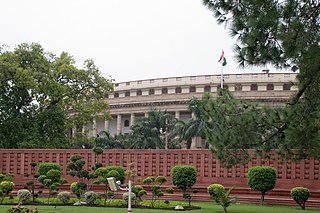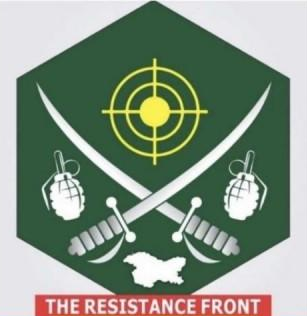Related Research Articles

Lashkar-e-Taiba is a terrorist group formed in Pakistan, and a militant and Islamist Salafi jihadist organisation. Described as one of Pakistan's "most powerful jihadi groups", it is most infamous outside Pakistan. The organisation's primary stated objective is to merge the whole of Kashmir with Pakistan. It was founded in 1985–1986 by Hafiz Saeed, Zafar Iqbal Shehbaz Abdullah Azzam and several other Islamist mujahideen with funding from Osama bin Laden during the Soviet–Afghan War. It has been designated a terrorist group by numerous countries.

Jaish-e-Mohammed is a Pakistan-based Deobandi jihadist terrorist group active in Kashmir. The group's primary motive is to separate Kashmir from India and merge it into Pakistan.

The insurgency in Jammu and Kashmir, also known as the Kashmir insurgency, is an ongoing separatist militant insurgency against the Indian administration in Jammu and Kashmir, a territory constituting the southwestern portion of the larger geographical region of Kashmir, which has been the subject of a territorial dispute between India and Pakistan since 1947.

The 2001 Indian Parliament attack was a terrorist attack on the Parliament of India in New Delhi, India on 13 December 2001. The attack was carried out by five armed assailants that resulted in the deaths of six Delhi Police personnel, two Parliament Security Service personnel, and a gardener. All the five terrorists were killed by security forces.

India and Pakistan have a complex and largely hostile relationship that is rooted in a multitude of historical and political events, most notably the partition of British India in August 1947.
The 2002 Qasim Nagar massacre was the killing of 29 Hindu labourers in Qasim Nagar on the outskirts of Jammu city in the erstwhile Indian state of Jammu and Kashmir by militants
2006 Doda Massacre refers to the massacre of 35 Hindu civilians by Lashkar-e-Taiba militants in the Doda district of Jammu and Kashmir, India on 30 April 2006.
2003 Nadimarg massacre was the killing of 24 Kashmiri Pandits in the village of Nadimarg in Pulwama District of Jammu and Kashmir on 23 March 2003. The Government of India blamed militants from the Pakistan-based terrorist group, Lashkar-e-Taiba but failed to secure convictions.

2001 Kishtwar massacre was the killing of 17 Hindu villagers in village Ladder near Kishtwar in Doda District of Jammu and Kashmir by Lashkar-e-Taiba militants on 3 August 2001.
Human rights abuses in Jammu and Kashmir range from mass killings, enforced disappearances, torture, rape and sexual abuse to political repression and suppression of freedom of speech. The Indian Army, Central Reserve Police Force (CRPF), and Border Security Personnel (BSF) have been accused of committing severe human rights abuses against Kashmiri civilians. According to Seema Kazi, militant groups have also been held responsible for similar crimes, but the vast majority of abuses have been perpetrated by the armed forces of the Indian government.
Abdul Rehman Makki is a Pakistani radical Islamist and the second-in-command of Jamaat-ud-Dawah (JuD) a Pakistani Islamic-welfarist-militant political organization and Naib Ameer of Lashkar-e-Taiba (LeT). He is the cousin and brother-in-law of Hafiz Muhammad Saeed. He has previously taught at the Islamic University of Madinah, Saudi Arabia, and, in 2004, released a book showing how fedayeen operations are not suicide attacks.
Abdul Rauf is a Pakistani Deobandi fundamentalist Islamist militant commander of the Jaish-e-Mohammed (JeM), a Deobandi Islamist militant organization which has carried out Islamist militant activities in India & Afghanistan under the support of Pakistan's main intelligence agency.
There have been several attacks on Indian Armed Forces by militants in 2016.
Sabzar Ahmed Bhat was a Kashmiri militant, who was the area commander of the militant organisation Hizbul Mujahideen. He was killed in an encounter by the police on 26 May 2017 at Tral.

Indian Army operations in Jammu and Kashmir include security operations such as Operation Rakshak, which began in 1990, Operation Sarp Vinash in 2003 and Operation Randori Behak in 2020. Other operations include humanitarian missions such as Operation Megh Rahat and operations with a social aim such as Operation Goodwill and Operation Calm Down. The Indian Army works in tandem with the other arms of the Indian Armed Forces and security forces in Jammu and Kashmir such as during Mission Sahayata or joint operations.

On 29 September 2016, teams of Indian Army commandos crossed the Line of Control into Pakistani-administered Kashmir to attack targets up to a kilometer within territory held by Pakistan. The raid occurred ten days after four militants had attacked an Indian army outpost at Uri on 18 September 2016 in the Indian state of Jammu and Kashmir, and killed 19 soldiers. Estimates of casualties from India's cross-border attack varied widely, with figures of 12 to 70 being reported. The Pakistani government eventually acknowledged the deaths of two soldiers and injuries to nine, while one Indian soldier was captured.
Shujaat Bukhari was an Indian journalist from the former state of Jammu & Kashmir, and was the founding editor of Rising Kashmir, a Srinagar-based newspaper.
Abu Qasim also known as Abdul Rahman was a Lashkar-e-Taiba commander and Pakistani national, who was the mastermind behind the 2015 Udhampur terrorist attack. He was killed on 29 October 2015 in the Kulgam area of Kashmir, in a joint operation by Jammu and Kashmir Police and the Indian Army. He had been active in the Kashmir Valley since 2009 and carried a cash reward of INR 20 lakh ₹2,000,000 (US$24,000) on his head.
The People's Anti-Fascist Front (PAFF) is a militant terrorist organization actively engaged in insurgency in Jammu and Kashmir, an ongoing armed conflict between Kashmiri separatist militants and Indian forces in Jammu and Kashmir. PAFF was established in 2020 by Jaish-e-Mohammad or Lashkar-e-Taiba, two Pakistan-based Jihadist groups.

The Resistance Front (TRF) is a militant organisation actively engaged in insurgency in Jammu and Kashmir, and designated as a terrorist organisation in India. Indian government and other experts believe that the organisation was founded by and is an offshoot of Lashkar-e-Taiba, a Pakistan-based Jihadist terrorist group. The group is responsible for attacks on and killings of civilians, including those belonging to religious minority communities such as Kashmiri Hindus government employees, labourers and business owners, local politicians, and tourists, as well as for several attacks on Indian security forces including local policemen.
References
- ↑ Singh, Vijaita (2015-08-05). "Udhampur attack: terrorists were from Pakistan". The Hindu. ISSN 0971-751X . Retrieved 2022-10-11.
- ↑ TwoCircles.net (2015-08-23). "NSA talks finally off, India says unfortunate". TwoCircles.net. Retrieved 2022-10-11.
- ↑ "Top Lashkar commander Abu Qasim, who plotted Udhampur attack shot". 25 December 2015.
- ↑ Ashiq, Peerzada (2015-10-30). "Violent protests, shutdown in Kashmir over killing of Lashkar man". The Hindu . Retrieved 2015-12-29.
- ↑ "Lashkar chief Hafiz Saeed's aide, who plotted Udhampur attack, killed in Pakistan". India Today. Retrieved 2023-12-06.
- ↑ "Trucker wanted in Udhampur terror attack case arrested". DNA India. Retrieved 2022-10-11.